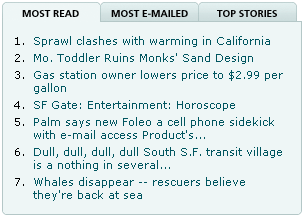Under siege from the future maybe, but news isn't in a terminal decline yet
Quite a few of the blogs I read about the news industry linked a couple of weeks back to an opinion piece by Neil Henry in the San Francisco Chronicle called "The decline of news".
He nails his colours firmly to the mast with the title of his most recent book - "American Carnival: Journalism Under Siege in an Age of New Media"
It struck me that this could be the latest in a long-line in books examining this recurring problem in society - "American Carnival: Railroads Under Siege in an Age of the Internal Combustion Engine", "American Carnival: Live Musicians Under Siege in an Age of the Automated Piano Roll", "American Carnival: Wagon Trains Under Siege in Age of the Iron Horse" and so on.
I expect you can go all the way back to "Amercian Carnival: Native Americans Under Siege in an Age of Westward Colonial European Expansion", and who can forget that seminal late seventies work "American Carnival: Music Under Siege in an Age of Home Taping"?
I mean, wasn't it ever thus?
The paper that originally published Henry's piece - The San Francisco Chronicle - takes its name from the annual lists of news and events that monks used to compile in the Dark Ages. I daresay that at some point they were equally as worried and annoyed as Neil Henry when news stopped being the exclusive preserve of the religious.
It isn't that I don't have any sympathy with his point of view and the situation that many news organisations and journalists find themselves in.
The introduction of new media in the last 15 years has been disruptive to a lot of industries, and it takes time for them to re-settle and regain their equilibrium.
It can be a major upheaval for the people involved - getting used to new ways of doing things, new avenues of customer feedback, and possibly having to find whole new careers as their old one disappears.
I should know. My first career was as an independent record retailer, a section of the music industry that has now almost been entirely destroyed.
You have to adapt and survive though - and I'm sure the news industry will manage just fine.
Perhaps, as Henry worries, there will be less 'investigative journalism' because tighter margins will make it prohibitively expensive.
On the other hand, new media also enables journalists to contact potential sources faster and more easily than ever before. Anonymous corporate blogging and whistle blowing initiatives like Wikileaks make it easier to find leads. And thanks to the younger socially networked generations, events like the Virginia Tech shootings now have more primary journalistic material than ever before.
The good news for Neil Henry is that whilst the San Francisco Chronicle may be shedding jobs, they clearly have some forward thinking people in the organisation - because the SFGate.com page on which he does his doomsaying has some real best practice examples of putting a newspaper online.
There is a dynamic panel indicating the most read and most emailed articles - allowing user behaviour to shape the editorial agenda on the page. That means people get to find more of the kind of news they want to read, encouraging people to stay on the site longer, generating more revenue.

There is a dynamic widget at the foot of the page to bookmark and share the content. This is a way that new media can be used to grow reach and audience and get people to read articles they otherwise would never have been exposed to.

Which again means more eyeballs for advertisers.
The page also includes a device allowing people to increase and decrease the size of the text, and it can be read aloud by screen-readers, making it much more accessible than the print edition.
One thing on the page seems really anachronistic though. At the foot of the article it states:
This article appeared on page B - 5 of the San Francisco Chronicle
Rather like when the search results for The Sun indicated the folio number and precise edition for each article, this seems something more likely to be of interest to a physical archivist rather than someone reading the page on the web.
But perhaps most importantly of all, I'm sitting in Crete, reading, and generating advertising revenue, for a local paper from San Francisco.
A new media future where the potential audience spans the globe can't be all that bad for the news industry, can it?
This article appeared on page B - 5 of the San Francisco Chronicle
Although you have to hope that if the "article" where Charlie Brooker caused offence to American patriots had a line which said "This article appeared in a jocular column in the listings section of The Guardian, and not on the Op-Ed pages", there might have been less of a shitstorm.
I don't know about you, but I'd love to see sites put up a top 5 least-read stories - at least to alert readers to some of things editors think important but readers don't. And perhaps to indicate more clearly where priorities diverge.
Someone knocked up a script that compares the BBC's editorial agenda with the "Most read" stats to see how 'In Touch' the BBC is with their audience - it makes for interesting viewing.